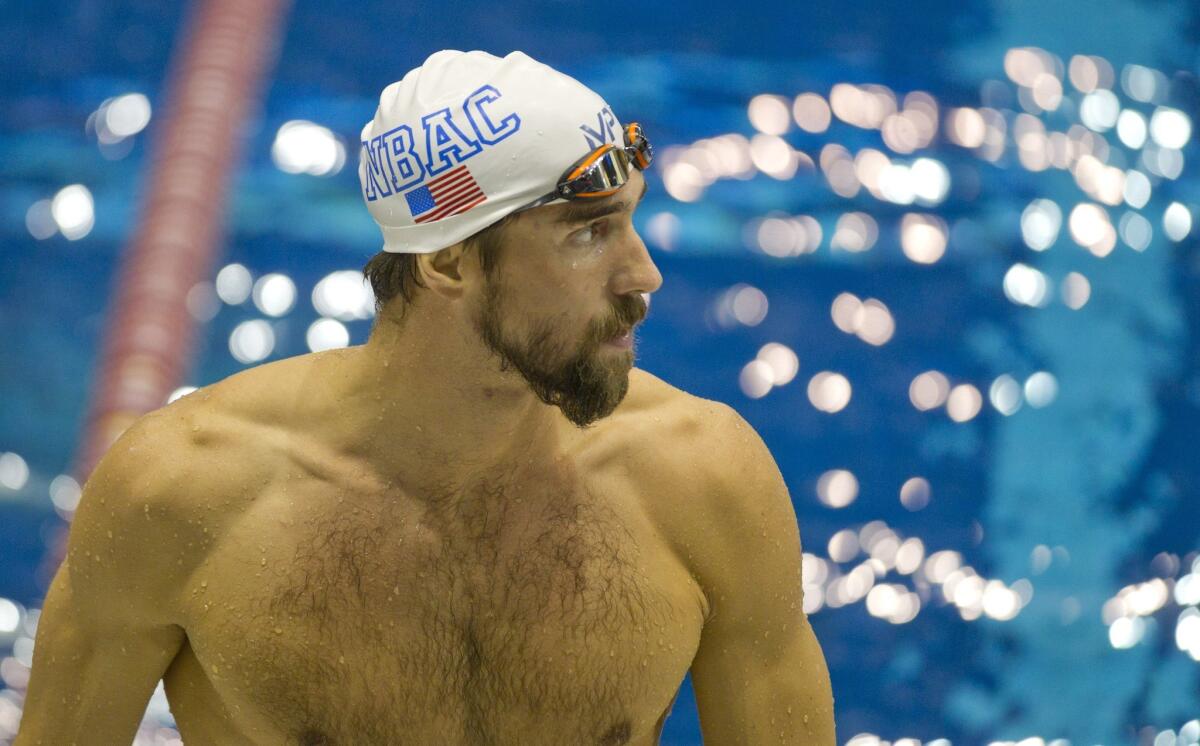Column: Sorry, parents: Genetic tests won’t show if your kid will be a sports superstar

Freak of nature or product of rigorous training? Olympic champion Michael Phelps, seen at a Minneapolis competition last week.
The business of selling genetic tests to parents hoping to determine whether their kids are fated to become sports stars has just sustained a couple of body blows from scientific papers published in two international journals.
Their mutual conclusion is that genetic testing can’t tell us anything about kids’ predisposition to skill in any particular sport or in athletics generally, and therefore that anyone claiming they can do so is hawking snake oil and potentially harming the kids. Indeed, parents who subject their children to such testing, much less refashion their lifestyles in response to supposed findings, are engaging in unethical behavior.
The current level of knowledge is being misrepresented for commercial purposes.
— British Journal of Sports Medicine, on genetic testing for athletic ability
Nevertheless, it’s a safe bet that the marketing of such tests, unethical as it is, won’t ebb any time soon. The public is increasingly inundated by news reports of genes coding for intelligence, strength, height, sex appeal--you name it. Nor does that include claims of genetic dispositions (or resistance) to certain diseases, some of which are real and others unconfirmed or premature. The caveats warning that the predictive power of these genetic associations may be marginal or even nonexistent never resonate as powerfully as the claims themselves.
The latest challenges to the test marketers come from papers in the British Journal of Sports Medicine and the U.S.-based Journal of Law and the Biosciences.
In the first, 24 experts, most of them in Europe, examine the state of scientific knowledge and conclude that the information provided by direct-to-consumer genetic tests is “virtually meaningless” as a predictor of sports performance. “The current level of knowledge is being misrepresented for commercial purposes” by testing firms that target coaches and parents, they conclude.
The second paper, by Timothy Caulfield of the University of Alberta and five international colleagues, warns of the damage that could be done to children by the stereotyping--positive or negative--”based on the mistaken belief that [genetic] information is more powerful than it is.”
They leave no doubt that they consider claims that athletic prowess can be revealed by genetic tests to be a swindle. Caulfield leads his paper with a sample of claims from the London-based Institute for Optimum Nutrition: “Gene testing provides the ultimate in personalized nutrition and training guidance,” etc., etc.
The British group identified no fewer than 39 companies hawking genetic tests related to sports performance to consumers. That’s a big increase from two years ago, when they counted 22. Few, if any, are in the U.S., where a surge in sports-related genetic test marketing firms appeared several years ago.
Most seem to have disappeared or dropped their athletic tests, possibly in response to a crackdown by the Food and Drug Administration, which signaled its approach in 2013 by effectively shutting down a health-related genetic testing service by the Silicon Valley firm 23andMe. The company has since reentered the market with a narrower and more scientifically responsible service, as we reported last month.
But nothing prevents American parents or coaches from doing business with foreign firms. As Caulfield observes, the attraction is powerful for parents who hope to “maximize their child’s odds at achieving athletic success through genetic testing.”
The scientific case for a genetic clue to athletic prowess, such as it is, rests on two genes, known as ACTN3, which is ostensibly associated with speed and power, and ACE, supposedly a contributor to endurance. Biologists say, however, that the links are tenuous and tiny at best, and almost certainly overwhelmed by other factors in athletic success. The British researchers note that some 20 million out of Britain’s 65 million population carry the ACTN3 speed/power variant, but “only a tiny fraction of those people are elite athletes.”
The greatest dangers, both papers agree, involve children. “While one could argue that legally competent adults should have the right to choose whatever service they have an interest in (however useless),” that’s not the case with “children and adolescents who lack legal capacity and may be particularly vulnerable to DTC marketing strategies,” Caulfield writes.
Athletic testing could discourage parents from allowing their kids to pursue a particular sport or push them into others, based on misconceived testing. And what happens to children who either fail to measure up to their genetic “potential” or who don’t show the genetic make-up their parents expect?
The ethical issues of genetic testing are only beginning to bubble up to the surface. These papers hint at one prospect: as fast as genetic science is progressing, the urge to market genetic tests as foolproof windows into our human potential is almost certain to develop faster.
Keep up to date with Michael Hiltzik. Follow @hiltzikm on Twitter, see our Facebook page, or email michael.hiltzik@latimes.com.
More to Read
Inside the business of entertainment
The Wide Shot brings you news, analysis and insights on everything from streaming wars to production — and what it all means for the future.
You may occasionally receive promotional content from the Los Angeles Times.










